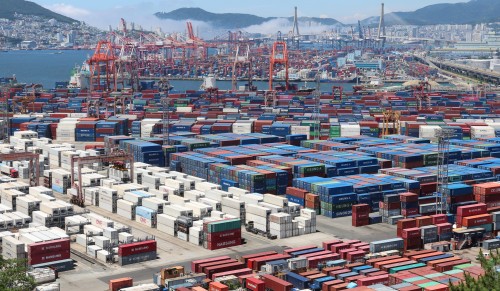 |
| According to Statistics Korea's May industrial activity report, total industrial production dropped 1.1% from the previous month. Containers are stacked at Sinseon and Gamman terminals in Busan on June 30. / Source: Yonhap News |
South Korea’s industrial production and investment weakened further in May amid sluggish domestic demand, despite the rollout of the first supplementary budget. As consumption remains stagnant for the third consecutive month, the government plans to swiftly pursue a second supplementary budget to stimulate the economy and stabilize livelihoods.
According to Statistics Korea’s May industrial activity report released on June 30, overall industrial production fell 1.1% from the previous month, marking a second straight month of decline following April’s 0.8% drop. A major drag came from the manufacturing sector, which saw a 2.9% decrease, including sharp drops in pharmaceuticals (-10.4%) and fabricated metals (-6.9%). Service sector output also declined by 0.1% due to contractions in information and communications (-3.6%) and transportation and warehousing (-2.4%), despite a 2.8% increase in finance and insurance.
Investment also showed continued weakness. Facility investment dropped 4.7% from April, registering negative growth for the third month in a row since March. Construction investment fell 3.9%, extending its decline for a third month as well.
Consumer activity remained sluggish. Retail sales showed no overall change from the previous month, with slight gains in durable goods (1.2%) and semi-durable goods (0.7%) offset by a decline in non-durable goods (-0.7%) such as cosmetics. Although this was a slight improvement compared to March (-1.0%) and April (-0.9%), sales failed to rebound even after the implementation of the first supplementary budget in May.
The slump is attributed to both weak domestic demand and lingering global uncertainties. Cho Sung-joong, director of economic analysis at the Ministry of Economy and Finance, noted, “With ongoing external uncertainties, such as U.S. tariffs, and continued domestic challenges, major industrial activity indicators such as total production have remained on a downward trend.”
The government is set to accelerate the implementation of a 30.5 trillion won second supplementary budget aimed at revitalizing domestic demand and supporting the livelihoods of citizens. Efforts will also be intensified to address trade risks, including U.S. tariff negotiations. Cho added that consumer stimulus measures like livelihood recovery coupons and regional gift certificates are expected to help boost demand.
Most Read
-
1
-
2
-
3
-
4
-
5
-
6
-
7





















